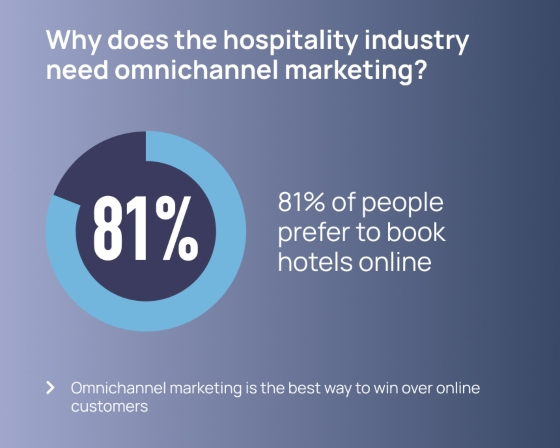Introduction
In the fast-paced and ever-evolving hospitality industry, delivering exceptional guest experiences is paramount. As we step into 2023, hospitality businesses are increasingly turning to innovative marketing strategies to gain a competitive edge. One such strategy that has garnered significant attention is "Omnichannel Marketing." In this article, we will explore how Omnichannel Marketing is revolutionizing the hospitality industry and transforming guest experiences for the better.

Understanding Omnichannel Marketing
Omnichannel Marketing is a comprehensive and integrated approach that allows hospitality businesses to connect with potential guests across various digital and physical touchpoints seamlessly. It focuses on delivering a consistent brand message and personalized experience regardless of the channels guests use to interact with the brand. From social media platforms and websites to mobile apps and physical locations, every touchpoint is part of a unified and cohesive journey.
The Impact on Guest Experiences
The implementation of Omnichannel Marketing in the hospitality industry has had a profound impact on guest experiences. Let's explore the key ways in which this strategy is enhancing guest interactions:
1. Personalization at Every Step
Omnichannel Marketing enables hospitality businesses to gather valuable data from guests' interactions across multiple channels. This data provides insights into guest preferences, behaviors, and past interactions, allowing for highly personalized and targeted marketing campaigns. As guests receive content and offers tailored to their specific needs, they feel more valued and connected to the brand.
2. Seamless Booking Process
Incorporating an Omnichannel approach streamlines the booking process for guests. Whether they make a reservation through the website, mobile app, or a physical location, the information is synchronized, ensuring consistency and accuracy. This seamless booking experience reduces friction for guests, making it more likely for them to complete their bookings and thus increasing direct bookings.
3. Unified Communication
One of the significant advantages of Omnichannel Marketing is the ability to communicate with guests through various channels consistently. Whether it's sending confirmations via email, providing updates through SMS, or engaging on social media, guests experience a unified and coherent communication flow. This cohesive approach fosters a sense of reliability and trust in the brand.
4. Enhanced Guest Loyalty
By tailoring interactions based on guest preferences, Omnichannel Marketing strengthens the bond between guests and hospitality businesses. The personalized experience creates a lasting impression, leading to increased guest loyalty and higher chances of repeat bookings. Satisfied guests are also more likely to become brand advocates, promoting the business through word-of-mouth and social media.
5. Real-time Engagement
Omnichannel Marketing platforms allow for real-time engagement with guests. Through live chat support, social media interactions, and personalized notifications, hospitality businesses can address guest queries and concerns promptly. This immediate responsiveness enhances guest satisfaction and demonstrates the brand's commitment to exceptional service.
6. Data-Driven Decision Making
With the abundance of data collected through Omnichannel Marketing, hospitality businesses gain valuable insights into guest behavior and preferences. Data-driven decision-making enables businesses to identify trends, optimize marketing strategies, and allocate resources effectively, resulting in higher returns on investment (ROI).
Embracing the Omnichannel Strategy
To harness the full potential of Omnichannel Marketing and its impact on guest experiences, hospitality businesses must take strategic steps:
1. Integration of Digital Platforms
Ensure seamless integration of all digital platforms, including the website, mobile app, social media, and email marketing. A unified platform will provide a consistent brand experience to guests, regardless of the channel they use.
2. Invest in Customer Data Management
Implement robust customer data management systems to collect, organize, and analyze guest data effectively. This information will form the foundation for personalized marketing campaigns and improved guest interactions.
3. Training and Collaboration
Train staff members across all departments to understand and utilize the Omnichannel approach effectively. Encourage collaboration among teams to deliver a consistent guest experience across all touchpoints.
4. Monitor and Optimize
Regularly monitor the performance of the Omnichannel Marketing strategy and make data-driven adjustments. Analyze guest feedback and behavior to identify areas for improvement and optimize the guest journey continually.
Conclusion
As the hospitality industry evolves, so do the expectations of guests. Embracing Omnichannel Marketing in 2023 has become a necessity for hospitality businesses looking to elevate guest experiences. From personalized interactions to seamless communication and increased guest loyalty, Omnichannel Marketing presents a transformative path to success. By adopting this approach, hospitality businesses can solidify their position in a highly competitive landscape and ensure a memorable and delightful experience for every guest.